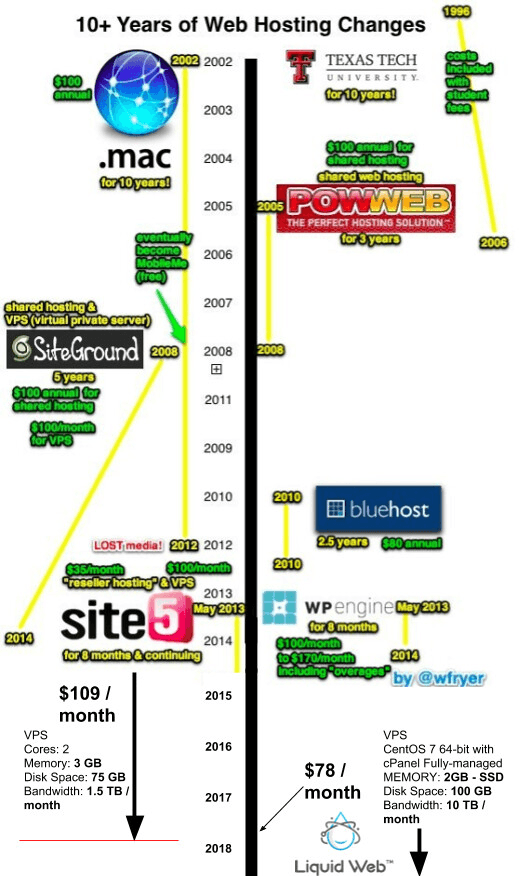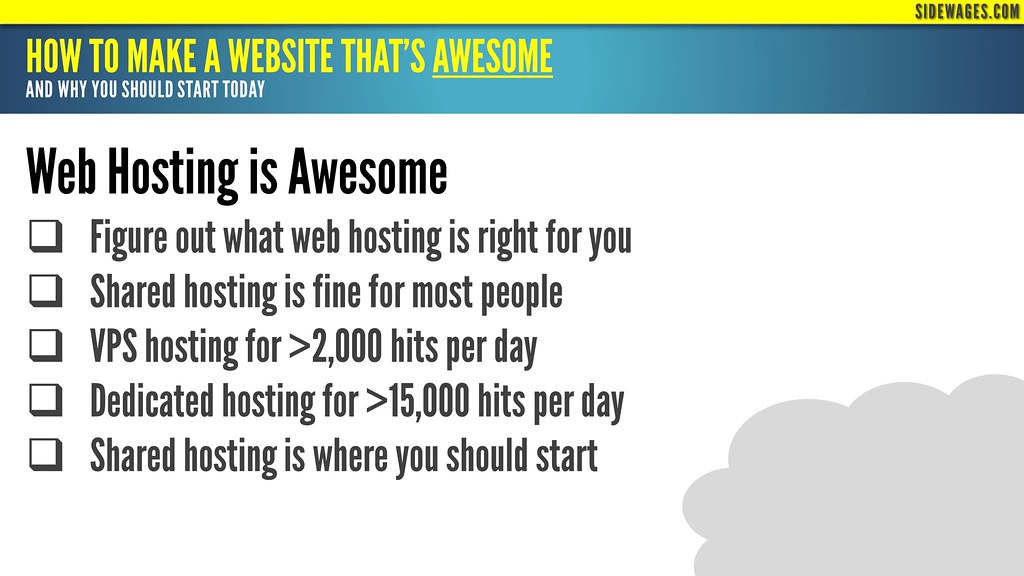VPS Vs Shared WordPress Hosting
It can be surprisingly complicated to choose a hosting plan for your WordPress site. There are a lot of options to choose from, and they all market themselves as the best option for you. It requires time and energy for you to distinguish one hosting option from another. One of the most common questions we hear is, what is the difference between shared hosting and VPS hosting?
It is important that you understand early on the answer to this question. Not all of the WordPress hosting types are suitable for your WP project. You could buy a space on a server that hosts a bunch of other sites as well, or you could have an entire server for yourself.
Almost as if by default, individuals and businesses host their new site using a shared plan. Shared plans are some of the most heavily advertised hosting options. A shared plan is inexpensive, and it’s not complicated. However, as these site owners watch their business grow, they realize that they need more resources than what a shared plan can provide. A virtual private server (VPS) may give your site what it needs to expand without being overly expensive.
Performance vs Convenience
To make this comparison a lot easier to understand, you can think of a VPS as a modded out performance vehicle that allows you to customize whatever you need to make it work. A shared provider is more like a regular sedan that is perfect for people who have no interest in speed or performance optimization.
Before we get into it, one important consideration we want to mention is security. With customization comes security issues and on average VPS servers are more prone to malware and nefarious third parties. A 2018 report by hosting researcher Gary Stevens showed that WordPress hosts are nearly twice as safe as out of the box VPS options.
Alright enough banter, let’s jump into the review In this guide, we are going to discuss the differences between shared WordPress hosting and VPS hosting. We will also discuss what option is right for you.
What Is Shared Hosting?
Shared hosting is best explained by using the comparison to an apartment. When a person lives in an apartment, they do not own the apartment that they live in, nor do they own the building that the apartment is a part of. With shared hosting, you neither own the server, nor do you own the part of the server where your website is housed. You are renting space from a hosting company.
As a tenant of an apartment, you do not have the entire building to yourself, but you share it with other people who are also renting space from the building owner. Everyone shares resources like water and electricity. With shared hosting, it’s pretty much the same. Your site is on a server, and there are a number of other sites on the same server. All of you are sharing the same resources.
In an apartment, the behavior of your neighbors will have an impact on your quality of life. If they listen to loud music, smoke, or have rowdy friends, you’re going to be affected. The same is true with shared hosting. If the other sites on the same server as yours engage in questionable activities or are not careful with their own security, they can impact the security of your site. If they use too many resources, the performance of your site will be affected.
A person might ask, why would anyone use shared hosting for their website? There are a lot of pluses. For example, renting an apartment is a lot cheaper than paying for a house. Shared hosting is drastically less expensive than having a dedicated server or a virtual private server.
The positives of shared hosting include:
- The ability to upload multiple domains
- It is professionally managed
- It can host dynamic websites
- It is flexible
- It is less expensive
When you rent an apartment and something breaks, you call the landlord and they fix it. That is the exact same thing happens with shared hosting. The hosting company you contract with is responsible for maintaining security, keeping things updated, and fixing anything that breaks.
Shared hosting is an entry-level service that can offer the level of resources that a local business or a small startup may require. Most shared hosting packages come pre-equipped with easy-to-use features and a user-friendly control panel. You are able to make changes to your email account, databases, and services easily.
The downsides of shared web hosting include:
- Limited resources
- Negative impact of other sites on your server
- Limited customization
- Limited disc space
- Limited customer service
For more info about this check out this great guide by Liquid Web.
Is Shared Hosting Right for You?
Shared hosting may be the right option for your WordPress site if you have very little experience with web hosting. This may be a good option for you if your primary concern is expense because using shared hosting will keep your expenses down.
If you are building something that’s not for professional use, maybe a website for friends and family, then shared hosting is perfect. The same is true if you are designing a small business website. Shared hosting is a good option for those who don’t need access to extensive web programming, those who are using their hosting as a way to learn an application like WordPress, or those who are experimenting with coding and web design.
When you launch a website for the first time, it’s highly unlikely that you are going to attract a ton of traffic. This is, of course, unless you are working with some major marketing campaign. A new website for a new company that is unheard of is not going to need a ton of bandwidth immediately.
When you start out, you are not going to know how much space you are going to need. Shared hosting offers you a flexible solution that does not break the bank but also leaves room for future growth.
What Is VPS Hosting?
Staying with the comparison of hosting to living quarters, VPS hosting could be compared to purchasing a condominium. When you purchase a condominium, you are still in a building that is shared by a number of people. However, you own the condominium, so all of the resources in the condominium are yours to use. You are able to completely customize your condominium to suit your needs.
VPS hosting allows you to have all of the advanced features that are usually enjoyed with a dedicated server only at a much lower price. When you purchase VPS hosting, you have access to all of the computing power that you need to run or grow a complicated business.
With a virtual private server, the service provider has one piece of hardware, which is the server. That server is virtually partitioned off into smaller sections. Each virtual section of the server has its own dedicated operating environment. It’s like having a condo that provides you with all of the protection and necessities of a freestanding house. Since the partitioning of the server is virtual, it is customizable and can be set to meet the needs of each individual based on their website.
The positives of VPS hosting:
- Reliability
- Flexibility
- Scalability
- Good customer service
- Expert security tools
A VPS gives you the security that comes from knowing that your website is going to run smoothly with little to no downtime. When you use a shared hosting plan, the bandwidth usage is shared among every website that’s on that server. The “bad neighbor effect” might impact your website’s uptime.
VPS hosting insulates your website from its neighbors because they are virtually partitioned from one another. All of the resources that you have allocated to you are only for your use. There is no competition for bandwidth usage, so this minimizes downtime.
In a shared hosting environment, you are not allowed to make changes to the operating system or to the coding because this could have a negative impact on the other websites that are hosted on the server. VPS hosting provides you complete flexibility, so you can make changes to your hosting environment to suit to the needs of your project without affecting your neighbors or impacting resources that they are using.
A dedicated virtual server space makes scaling simpler. As your business gets larger and you have more people visiting your site, you can increase the size of storage, bandwidth, and email accounts to make sure that your hosting keeps pace with your business growth.
The downsides of VPS hosting include:
- More expensive than shared hosting
- Configuring the server requires technical experience
- Your hosting company may not allocate your resources properly because they’ve sold more space than they can handle
A good VPS package is going to have a sufficient amount of RAM and bandwidth to keep your site functioning without glitches. You want to have enough disc space so that you can fit all of your files into one digital storage space.
When searching for a VPS package, you want to work with a hosting company that is going to offer you a sufficient number of monthly data transfers as part of the space fee. You do not want to work with a company that’s going to nickel and dime you after you exceed the initial amount of transfers they have allotted.
Your VPS package should allow you to create as many email accounts as you need for your business to grow. Your email should be able to scale with the rest of your business. Your email package should have sufficient storage for each individual account. Some of the better packages we have seen offer 500 MB or 10,000 email messages.
It is easy to be attracted to a VPS package that offers unlimited disc space. It’s okay to purchase one that offers this feature, as long as you understand that technically it is impossible to offer someone unlimited space. However, the idea is that you should have a sufficient amount of space to be able to operate effectively.
Is VPS Hosting Right for Me?
VPS hosting plans are designed to bridge the gap between a beginner level web hosting plan that has severe limitations and a dedicated server that is, quite frankly, more than what most small businesses need. It’s perfect for a company that has outgrown shared hosting and needs something that will offer them room to grow.
VPS hosting is a great option for businesses that are not looking to store confidential data. Although VPS hosting creates a virtual partition between your virtual server and that of your neighbor, when hardware is being shared, there is always the risk that one could fall victim to a cyber attack. If you are looking to store confidential information, then a private cloud server or a dedicated server may be the right option for you.
Typical Customers for a VPS Hosting Solution
Individuals developing their sites and applications benefit from VPS. Cloud VPS is an excellent environment for you to get started. You can start out using a relatively small virtual space and then re-size as the actual storage needs of your site or application become apparent.
Individuals hosting small sites and applications may benefit from VPS. If you have a static website, a site that has medium traffic, or apps with databases that only have a few requests, you can effectively run these without needing to pay for a large environment. A VPS solution is fast, provides ample space, and will not break the bank.
Individuals looking for file storage in the cloud may use VPS. There are a number of businesses that don’t have the resources to host on-site servers that their employees can readily access. A VPS is a nice way to have all of your files in a centralized location, giving authorized employees the access they will require.
In this same scenario, a VPS can be used to create infrastructure via the cloud. This makes sharing and collaboration a lot easier. When data is stored off-site using a VPS hosting provider, secure connectivity can be created for employees. This allows them to collaborate, store, share, and access data with little effort. Since you will manage the environment, you can guarantee that it’s going to be secure and easy to recover in the case of a disaster.
Clearly, VPS hosting and shared WordPress hosting have their advantages and disadvantages. If you are looking at starting a project that you’re going to take seriously or use professionally, we recommend going the VPS route. It offers you the security, scalability, and reliability that can make the difference between your website or your application being a success or being a failure.
We would love to hear from you. Are you currently using shared WordPress hosting or are you using VPS hosting? Let us know how it’s working out for you in the comments section below.



